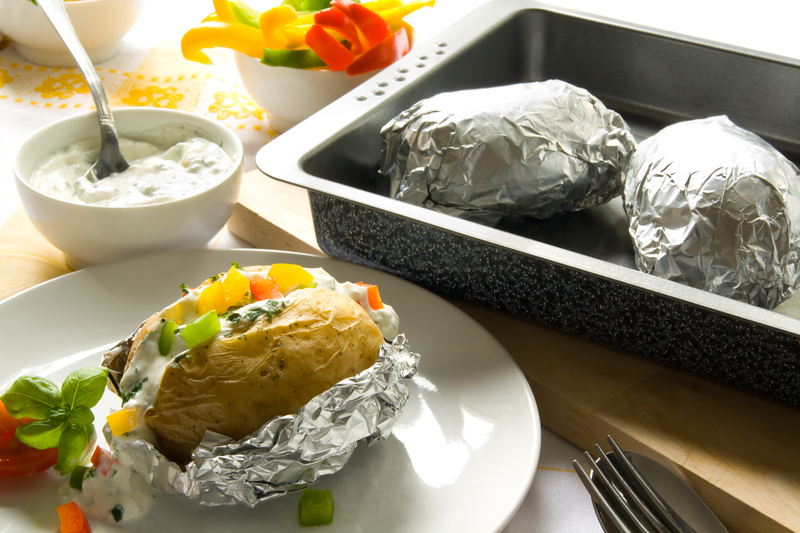 When it comes to preparing the perfect baked potato, there’s often a debate about whether or not to wrap them in foil before placing them in the oven.
When it comes to preparing the perfect baked potato, there’s often a debate about whether or not to wrap them in foil before placing them in the oven.
Some people swear by this method, claiming it helps to retain moisture and cook the potatoes evenly.
Others argue that foil-wrapping can hinder the development of that sought-after crispy skin.
In this article, we’ll delve into the pros and cons of wrapping potatoes in foil for baking, so you can make an informed decision for your next potato dish.
Pros of Wrapping Potatoes in Foil
- Even Cooking
One of the primary reasons people choose to wrap their potatoes in foil is to ensure even cooking.
Foil acts as a heat conductor, helping to distribute heat evenly around the potato.
This can be particularly beneficial when cooking larger potatoes or when baking multiple potatoes at once, as it reduces the risk of unevenly cooked spuds.
- Moisture Retention
Foil also helps trap moisture within the potato, preventing it from drying out during the baking process.
The moisture within the potato contributes to a creamy interior, which is prized by many potato enthusiasts.
Foil-wrapped potatoes tend to be softer and more tender than their unwrapped counterparts.
- Flavor Infusion
By wrapping your potatoes in foil, you can experiment with adding various flavors and seasonings.
The foil creates a sealed environment, allowing the potatoes to absorb the flavors more effectively.
You can include ingredients like garlic, herbs, butter, or olive oil to enhance the taste of your baked potatoes.
Cons of Wrapping Potatoes in Foil

- Lack of Crispy Skin
One of the most significant drawbacks of wrapping potatoes in foil is that it impedes the formation of a crispy skin.
The foil essentially steams the potato, preventing the skin from becoming crispy and golden brown.
For those who crave the satisfying crunch of a well-baked potato skin, this is a significant disadvantage.
- Extended Cooking Time
Potatoes baked in foil tend to take longer to cook compared to their unwrapped counterparts.
The foil acts as a barrier that slows down the cooking process, which can be frustrating if you’re looking to prepare a quick meal.
Extended cooking times can also result in overcooking, making the potato mushy.
- Potential for Sogginess
If not properly ventilated, foil-wrapped potatoes can become soggy.
The trapped moisture can lead to a lackluster texture, and no one wants a soggy potato.
To avoid this, it’s crucial to poke holes in the foil or leave a small opening for steam to escape.
Bottom Line – Should Oven-Baked Potatoes Be Wrapped in Foil?
So, should oven-baked potatoes be wrapped in foil?
The answer ultimately depends on your preferences and desired outcome.
Wrapping potatoes in foil can be a useful technique when you want to ensure even cooking and retain moisture, leading to a softer, creamier interior.
However, it comes at the cost of a crispy skin and extended cooking times.
If you’re a fan of that delightful crunch, it might be best to skip the foil and bake your potatoes uncovered.
Experimentation is the key to finding the perfect method for your taste buds, so don’t hesitate to try both approaches and discover which one suits your potato dish best.


